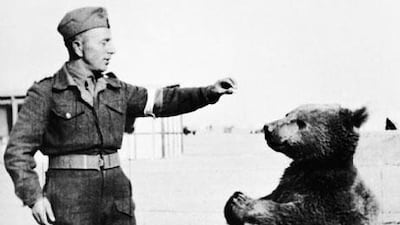LONDON // Private Wojtek, whose remarkable feats became legendary among Polish forces fighting the Nazis in the Second World War, is finally to be honoured with a bronze statue in Edinburgh, where he made his home at the end of hostilities.
Although Wojtek would enjoy a beer and the occasional cigarette with his comrades on the front line, he stood out from the rest. He was a bear.
The Syrian brown bear was acquired by members of the Polish Second Corps in Iran in 1942 after they had travelled there after being released from Russian internship. The young cub was given to the troops by a shepherd boy in exchange for tinned meat, and the corps promptly adopted him as its mascot.
He accompanied the troops in a lengthy journey across Iraq, the Levant and Egypt before travelling by ship to Europe to join the fighting.
Once there, the Poles discovered that having animals as mascots was banned for the duration of the war, so they enlisted the bear as a Private Wojtek (pronounced Voy-chek), which translates into "smiling warrior".
Reared initially on milk fed to him from a vodka bottle, he progressed to a diet of fruit, marmalade, syrup and, of course, honey. His less healthy habits included consuming beer and cigarettes as he sat round camp fires with his fellow soldiers.
"He just did what the men did and when they had a bottle of beer at night and some cigarettes, so did he, although he ate the cigarettes rather than smoke them," Aileen Orr, whose book Wojtek the Bear, Polish War Hero was published last year, told The Times.
The bear achieved the status of hero at the Battle of Monte Cassino in Italy in 1944 where, again copying his fellow soldiers, he carried crates of shells to the front.
After the war, Wojtek moved with his comrades to a camp in Scotland, rather than return to Russian-occupied Poland. When the camp was closed, he moved to Edinburgh Zoo, where he died in 1963.
The Wojtek Memorial Trust, of which Ms Orr is a member, now plans to erect a 2.7 metre-high statue of Wojtek outside St Mary's Roman Catholic Cathedral in the Scottish capital.
Ms Orr, whose father encountered Wojtek during wartime service in Egypt and the Levant, said: "Wojtek is a part of our own history, a feel-good story that has captivated so many people around the world.
"It's hugely positive for Scotland and also a huge tourist draw. This is not a military thing. It's very much a humanitarian, touching story, a story beyond politics and war. It's about comradeship."
The trust has so far raised about a quarter of the £200,000 (Dh1.1m) it needs to finance the project.

